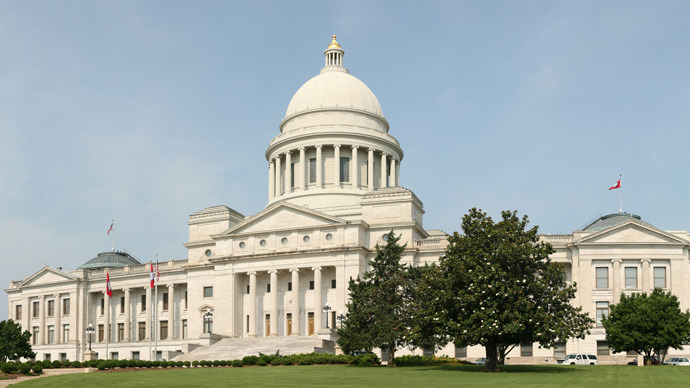Arkansas adopts most restrictive abortion law in US

Women looking to procure an abortion in the state of Arkansas will no longer be able to do so after 12 weeks of pregnancy. The state has passed the most restrictive abortion law in the US, prompting opponents to threaten the legislature with a lawsuit.
Arkansas’ latest abortion bill, the Human Heartbeat Protection Act, was passed just a few weeks after lawmakers voted to ban abortions after 20 weeks of pregnancy – with no exceptions for victims or rape or incest. That bill has already taken effect and the 12-week ban will go into effect this summer.
Republican Sen. Jason Rapert, who sponsored the latest abortion bill, compared the more than 50 million US abortions to the Holocaust and the Rwandan genocide and said that “it’s time to take a stand” against abortions.’
“When is enough enough?” he asked the legislature before the vote.
But the bill was passed despite a wave of opposition from abortion rights proponents and Democratic lawmakers, who vetoed to bill. Both the House and the Senate voted to override the veto, instigating widespread anger over the disregard of the opposing side.
"I think today, for whatever reason, the Arkansas House turned its back on the women of Arkansas and said, we don't think you're capable of making your own decisions," Rita Sklar, ACLU of Arkansas' executive director, told the Associated Press.
"The Arkansas Legislature has once again disregarded women's health care and passed the most extreme anti-women's health bill in the country," said Jill June, the CEO of Planned Parenthood of the Heartland. "With this bill, the Arkansas Legislature will force many women to seek unsafe care."
Some opponents of the measure claim that the bill is unconstitutional because it contradicts the 1973 Roe v. Wade ruling that legalized abortion until a fetus could survive outside of the womb. Usually, a fetus can survive on its own after 22 to 24 weeks. Democratic Arkansas Gov. Mike Beebe has called the bill “blatantly unconstitutional” and anti-abortion leaders have referred it is as a ‘futile’ gesture.
The ACLU plans to partner with the Center for Reproductive Rights to file a lawsuit in federal court in the upcoming weeks.
“We are preparing the papers to go to court as we speak. In fact, we’ve been working on them since the bill was filed,” Sklar told Politico. “It is flat-out unconstitutional… it would be the most extreme, severe abortion law in the country.”
While nine other states have enacted laws banning abortions after 20 weeks of pregnancy, Arkansas is the only state to ban them within the first trimester.
But with a Republican majority in the Arkansas legislature, lawmakers may continue their fight to implement tighter abortion laws – even if the latest bill is ruled unconstitutional.
"This is a day of celebration within our state, where we can say that we as the state of Arkansas, we stand for life," Cox told CNN affiliate KARK-TV. "We're going to continue to fight until Arkansas stays a solid state for life."














